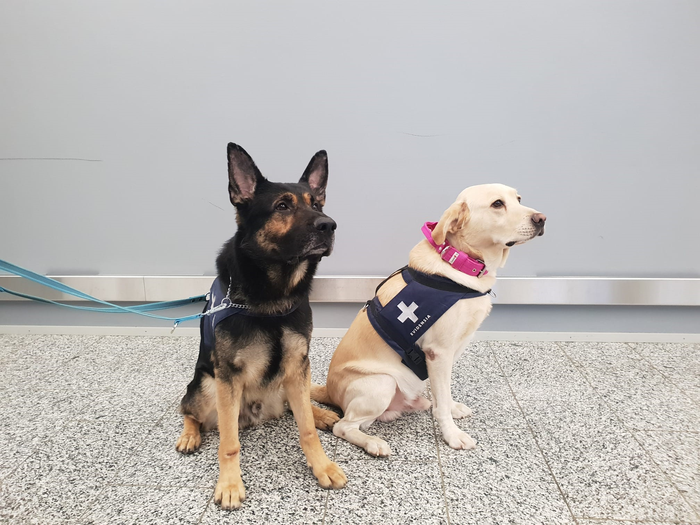Studies have reported that dogs have very sensitive olfactory systems with their limit of detection exceeding the diagnostic ability of current laboratory instruments. It is presumed that dogs can detect distinctive volatile organic compounds (VOCs) that are released by the metabolic pathways of their hosts in parasitic, bacterial, and viral infections. The scent dog approach is especially appealing for coronavirus disease 2019 (COVID-19) screening in public places and among masses of airport passengers.

Study: Scent dogs in detection of COVID-19: triple-blinded randomised trial and operational real-life screening in airport setting. Corona detection dog Silja at the Helsinki-Vantaa airport. Image Credit: Egil Björkman
About the study
The researchers of the present study estimated the diagnostic accuracy [specificity, sensitivity, negative predictive value (NPV), and positive predictive value (PPV)] of scent dog SARS-CoV-2 identification compared to reverse transcription-polymerase chain reaction (RT-PCR). In addition, the variant status of the SARS-CoV-2 infection was determined using bioinformatics analysis and genomic sequencing.
In spring 2020, the authors began to train dogs to identify SARS-CoV-2-infected samples and, subsequently, in autumn, they started operational SARS-CoV-2 screening at the Helsinki-Vantaa International Airport.
In this report, they presented the findings of their study, which comprised (1) dog training, (2) a randomized, prospective, triple-blinded study with four dogs, and (3) a prospective, real-life study with the same dogs for regularly screening arrival passengers. The screening comprised dog scent detection tests and nasopharyngeal swab RT-PCR tests performed simultaneously.
The study participants were (1) inpatients, (2) healthy individuals, and outpatients who were telephonically contacted or who approached the research team in response to advertisements that were posted at RT-PCR analysis stations in the vicinity of Helsinki, and (3) arrival passengers and airport personnel.
Individuals with a SARS-CoV-2-negative RT-PCR report performed within three days of travel were not tested again. The participants filled out questionnaires to obtain data on their demographics, COVID-19 symptoms, and RT-PCR test reports. Personal interviews and electronic medical records of hospitalized COVID-19 patients were also used.
A cubicle was specially built at the arrival terminal and was used for the study. The cubicle comprised three rooms for skin swab sampling of arrival passengers and a dog working area with sliding hatches on the walls for tracks and samples.
Four dogs were trained for SARS-CoV-2 detection from skin swabs. The controlled triple-blinded validation study comprised four identical sets of 420 parallel samples (from 114 RT-PCR-positive and 306 RT-PCR-negative individuals), randomly presented to every dog over seven validation sessions (VALI-7). The dogs screened skin swabs from 303 incoming passengers, all concomitantly examined by nasal swab RT-PCR.
The dogs were trained at a training center and subsequently in the airport’s purpose-built cubicle using operant conditioning by skilled canine scent detection trainers. For every validation study session, four dogs were used and 60 cans were arranged for every dog as follows: each zip lock bag that contained the test sample was opened, and gauze was removed from the bag using sterile tweezers and transferred into a can which was lined with a one-liter plastic freezer bag. The cans were subsequently loaded onto scent tracks based on a computer-generated randomization list, following which the tracks were moved to the study cubicle with the help of a trolley.
The real-life operational study was conducted between September 23, 2020, and April 30, 2021. In total, 10,119 individuals (travelers and airport employees) participated in the study, resulting in 48 (0.5%) samples indicated as positive, a part of which were used for the validation study.
Results
In the validation study, the overall diagnostic accuracy of dog scent detection was 92% sensitivity and 91% specificity compared to RT-PCR. Based on the prevalence of SARS-CoV-2-positive samples in the study (27%), the overall PPV was 84% and NPV was 96%.
In the prospective, real-life airport setting study, scent dog detection and RT-PCR diagnosis matched 99% of the negative swabs. Scant airport prevalence (0.5%) did not allow sensitivity testing; however, the ad hoc analysis, including predefined positive SARS-CoV-2 S samples showed 98% diagnostic accuracy.
Failure to detect a SARS-CoV-2-positive sample was associated with the SARS-CoV-2 Alpha variant [Alpha versus wild-type odds ratio (OR) =14]. The scent dogs identified 89% of the wild-type-infected samples correctly but only 36% of the Alpha-infected samples.
The concomitant presence of chronic diseases, the time interval between symptom onset and sample collection, the time elapsed since the RT-PCR test, and patient age were not associated with SARS-CoV-2 scent dog detection failure.
Overall, the study findings showed that trained scent dogs could be a valuable adjunct to RT-PCR for COVID-19 screening at airports with high diagnostic accuracy. In addition, the scent dog approach could be especially useful for mass screening for SARS-CoV-2 infections on a large scale, although continual dog training is required for the detection of SARS-CoV-2 variants by scent dogs.
Journal reference:
- Kantele A, Paajanen J, Turunen S, et al. Scent dogs in detection of COVID-19: triple-blinded randomised trial and operational real-life screening in airport setting. BMJ Global Health 2022;7:e008024. doi:10.1136/ bmjgh-2021-008024, DOI: 10.1136/bmjgh-2021-008024, https://gh.bmj.com/content/7/5/e008024